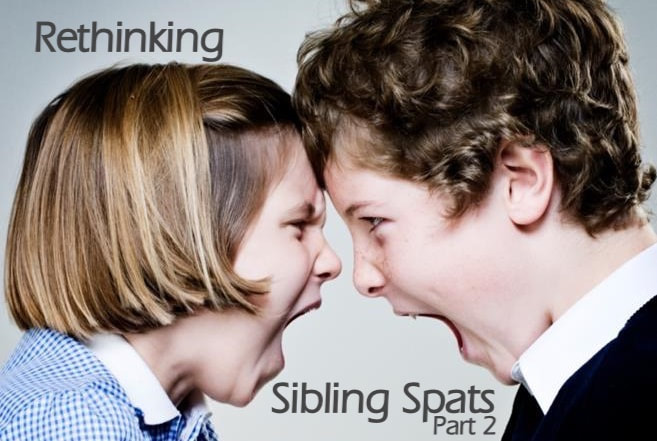|
In the last post (click here for part 1), we discussed how sibling conflict could actually be beneficial to your children and family when it is done well. This sounds great, but doesn’t go unnoticed that many parents do not know what healthy conflict means. In fact, to those who grew up in homes with anger, yelling, or an “anything goes” mentality, avoiding conflict may be your most trusted approach. Or, perhaps your parents were the ones avoiding conflict, and you were left wondering what the silence meant. The idea that conflict can be good may not be something you’re ready to fully embrace. After all, we don’t see good conflict played out much in the real world these days. Isn’t that all the more reason to equip your children with the skills they need to change that? I sincerely do hope you see the possibilities that can happen with the relationships in your home, and you feel empowered to start making some of those changes for peace today. As promised, here are more than a few, but by no means a comprehensive list, of practical tips and a glimpse into what it might look like for conflict to go well for your kids. Clarity Respect was the first benefit of healthy conflict discussed in the last post. One of the reasons it’s helpful to divide behaviors into categories (respectful/disrespectful, fair fighting/dirty fighting, kind/unkind) is because it’s clear. Children, especially young children, do not do well with vague ambiguity and nuance. They need as much directness and clarity as possible. Two areas parents often inadvertently leave gray are rules and consequences.
Does your child say he isn’t allowed to yell, hit, or call his sister names because it’s not nice, and unkind behavior is not allowed in his house? Great! There is clarity of household expectations in that response. But is the answer to question number two some variation of, “I would get in trouble”, “Mom would be mad”, or “Dad would yell at me”? No bueno! One of the first things to consider is that actual consequences versus general disapproval of behaviors offer far more clarity for kids. Boundaries don’t work well if you only have them in theory, but fail to actually hold them. Second, you want your child to know the specifics so they can consciously make a choice. If they get a consequence 50% of the time, they don’t really know what will happen if they cross a boundary. Yes, they may know you won’t like it, but that may not be enough to deter the lure of instant gratification. Here are some examples of what a child might say when consequences are clear:
Take the time to figure out the rules and consequences in your home, and communicate them directly and clearly to your kids. This does not have to be a super serious or strict process. It can be fun, creative, or meaningful. I once knew a family who went on a treasure hunt with their young kids to find “The Family Code.” They followed a map on an adventure and eventually dug up a box in the yard that had been buried by their ancestors (aka mom and dad). Inside, were handwritten stories to them about what code their family chose to live by and why. What an amazing way to introduce a new family concept to kids. They’ll surely remember that experience! Emotion Coaching Helping your kids process their emotions is a major part of parenting and resolving conflict in a healthy way. Will your home sometimes feel like a never-ending, drama filled telenovella? Yes, but fighting through the exhaustion of this to teach them how to recognize and address their emotions is definitely not something you’ll regret. Remember, at times it’s difficult as an adult to respond instead of react to triggering events. Children, whose brains are still developing, constantly learn what it means to self regulate. Hurt and anger are two strong emotions that can be particularly challenging for kids to process, and occur often in sibling spats. Forgiveness is very important in processing hurt and anger, and we discussed its powerful connecting benefits for families in the last post. Equally powerful is the disconnecting effect of holding a grudge. Here are a few signs that might be happening in your home:
It’s easy to see these signs of a grudge play out in sibling conflict, which is why it’s a great time to seize the teaching moment. There are two goals when guiding your kids through their feelings. First, you want them to be able to recognize and identify what is going on, and second, to be able to address their feelings effectively. Emotions are not good or bad, they are just our mind and body’s way of telling us something is going on. Separating emotions from behaviors makes it easier for kids to start recognizing the difference for themselves. Guiding your child in understanding the difference between feeling an emotion and choosing what to do with it is extremely helpful. Here are some examples of what that might sound like:
Intense concerns over fairness and justice are a normal part of child development, as often demonstrated by the tattling phase. Your children may have a really hard time focusing on themselves rather than what was done to them. Tit for tat mentality is common. Teaching them that they alone are responsible for their emotions and behavior is critical to accountability. Validating your child’s feelings in the midst of their misbehavior communicates to them that their emotions make sense, but their actions are not acceptable. Children are also much more receptive to hearing you address necessary behavior changes when they feel you understand their feelings. Role-playing with your kids is a great way to help them work through their feelings and expose them to healthy alternatives to fighting with their brothers and sisters. When you see them handling things poorly, sit with them and request a redo. Walk through a better way, and have them play it out. Experiential learning works very well. If you notice your child is holding a grudge, encourage them to (kindly) voice hurts to their siblings so their brother or sister has a chance to make it right. One can’t expect people to change if they don’t know they hurt you. As a parent, it’s so hard to see your child hurting. Intense emotions can be difficult to navigate, especially when you just want to make it better. While, at times, you may struggle with confidence that you are handling your child’s emotions well, you know them the best and are the person who influences them the most. If you’re like most parents, you work hard and are praying for more patience. It takes resolve to do your job well. Continual learning also helps. It may seem as soon as you get one stage figured out, your child is on to another. Talking with other parents, books, counseling, or classes can all be great resources. If you would like to learn more about teaching healthy communication and conflict resolution to your kids, check out our upcoming workshop on Sunday, May 20th, 2018. Resources: https://www.amazon.com/Raising-Emotionally-Intelligent-Child-Parenting/dp/0684838656/ref=sr_1_7?s=books&ie=UTF8&qid=1522080731&sr=1-7&keywords=john+gottman https://www.amazon.com/When-Sorry-Isnt-Enough-Making/dp/0802407048/ref=sr_1_4?s=books&ie=UTF8&qid=1522080515&sr=1-4&keywords=gary+chapman+apology https://www.amazon.com/Boundaries-Kids-Children-Control-Their/dp/0310243157/ref=sr_1_5?s=books&ie=UTF8&qid=1522080824&sr=1-5&keywords=boundaries+by+cloud+and+townsend https://www.amazon.com/Boundaries-Teens-When-Say-Yes/dp/0310270456/ref=sr_1_11?s=books&ie=UTF8&qid=1522080824&sr=1-11&keywords=boundaries+by+cloud+and+townsend Comments are closed.
|
Categories
All
Archives
March 2023
|
[email protected]


 RSS Feed
RSS Feed